How to eliminate the Stratus malicious browser extension
AdwareAlso Known As: Stratus unwanted browser extension
Get free scan and check if your device is infected.
Remove it nowTo use full-featured product, you have to purchase a license for Combo Cleaner. Seven days free trial available. Combo Cleaner is owned and operated by RCS LT, the parent company of PCRisk.com.
What kind of software is Stratus?
Our research team found the Stratus malicious browser extension in an installation setup promoted by a deceptive webpage. It is pertinent to mention that such installers may contain multiple pieces of unwanted/dangerous software.
The Stratus extension targets Google Chrome and Microsoft Edge browsers. It can alter this software and collect sensitive browsing-related information.
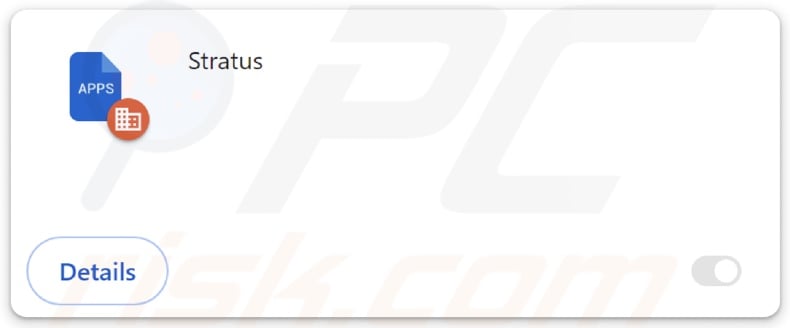
Stratus overview
On Chrome and Edge, Stratus can manage their apps, extensions, themes, and other settings. These capabilities allow this malicious software to change the browsers' appearance and operation.
Stratus also uses the "Managed by your organization" feature (Chrome, Edge) for additional control and functionality. This feature might also be utilized as a persistence-ensuring mechanism that complicates the extension's removal and prevents users from recovering their browsers.
The whole of Stratus' abilities could be used for a variety of malicious purposes. One potential use could be to exploit browser vulnerabilities in order to cause further infections.
What is more, like most rogue extensions, Stratus has data-tracking functionalities. It can read browsing histories and extract vulnerable information. Targeted data may include: URLs visited, webpages viewed, search queries typed, Internet cookies, log-in credentials, personally identifiable details, credit card numbers, and so forth. The gathered information can then be monetized via sale to third-parties.
In summary, the presence of software like Stratus on devices may lead to system infections, serious privacy issues, financial losses, and even identity theft.
| Name | Stratus unwanted browser extension |
| Threat Type | Malicious Extension, Unwanted Extension |
| Browser Extension(s) | Stratus |
| Detection Names (installer) | ESET-NOD32 (Win32/DragonBossSolutions.B Potentially), Kaspersky (Not-a-virus:HEUR:AdWare.Win32.WebCo), Zillya (Adware.WebCompanion.Win32.23), ZoneAlarm by Check Point (Not-a-virus:HEUR:AdWare.Win32.WebCo), Full List Of Detections (VirusTotal) |
| Symptoms | The "Managed by your organization" feature is activated in Chrome or Edge browser, decreased Internet browsing speed, your computer becomes slower than usual. |
| Distribution Methods | Dubious websites, malicious installers, deceptive pop-up ads, free software installers (bundling), torrent file downloads. |
| Damage | Decreased computer performance, browser tracking - privacy issues, possible additional malware infections. |
| Malware Removal (Windows) |
To eliminate possible malware infections, scan your computer with legitimate antivirus software. Our security researchers recommend using Combo Cleaner. Download Combo CleanerTo use full-featured product, you have to purchase a license for Combo Cleaner. 7 days free trial available. Combo Cleaner is owned and operated by RCS LT, the parent company of PCRisk.com. |
Similar software examples
We have analyzed thousands of rogue browser extensions; CumulusCongestus, CrotalusAtrox, and AconitumNapellus are just a few examples of ones similar to Stratus.
In addition to data tracking, unwanted extensions can exhibit adware and browser hijacker capabilities. Rogue browser extensions typically presented as legitimate and useful software. However, the promised features are rarely operational.
It must be stressed that even if a browser extension or an application works exactly as indicated by its promotional material – that is not a guarantee of legitimacy or safety.
How did Stratus install on my computer?
We downloaded an installation setup containing Stratus from a deceptive site. Keep in mind that such installers can include multiple unwanted/malicious additions.
Aside from scam pages, rogue browser extensions can have "official" promotional websites. Most visitors to these webpages access them through redirects caused by sites using rogue advertising networks, intrusive ads, spam browser notifications, mistyped URLs, or installed adware.
Malicious browser extensions can also be bundled with ordinary software. The risk of inadvertently permitting access for bundled content into the system is increased by downloading from untrustworthy sources (e.g., freeware and third-party websites, P2P sharing networks, etc.) and by treating installations with negligence (e.g., skipping steps, using "Quick/Easy" settings, etc.).
Intrusive adverts proliferate rogue software as well. Once clicked on, some of the advertisements can execute scripts to perform downloads/installations without user consent.
How to avoid installation of unwanted software?
It is essential to research software prior to downloading or purchasing it. Furthermore, all downloads must be made from official and verified channels. Installation processes must be treated with caution, e.g., by reading terms, exploring possible options, using the "Custom/Advanced" settings, and opting out of supplementary apps, extensions, tools, features, etc.
We advise being vigilant while browsing since fraudulent and dangerous online content typically appears genuine and harmless. For example, intrusive advertisements may look innocuous – however, they redirect to highly questionable sites (e.g., scam-promoting, adult dating, gambling, pornography, etc.).
In case of continuous encounters with such ads/redirects, inspect the system and immediately remove all suspicious applications and browser extensions/plug-ins. If your computer is already infected with Stratus, we recommend running a scan with Combo Cleaner Antivirus for Windows to automatically eliminate this rogue software.
Screenshot of a website used to promote an installer containing the Stratus extension:
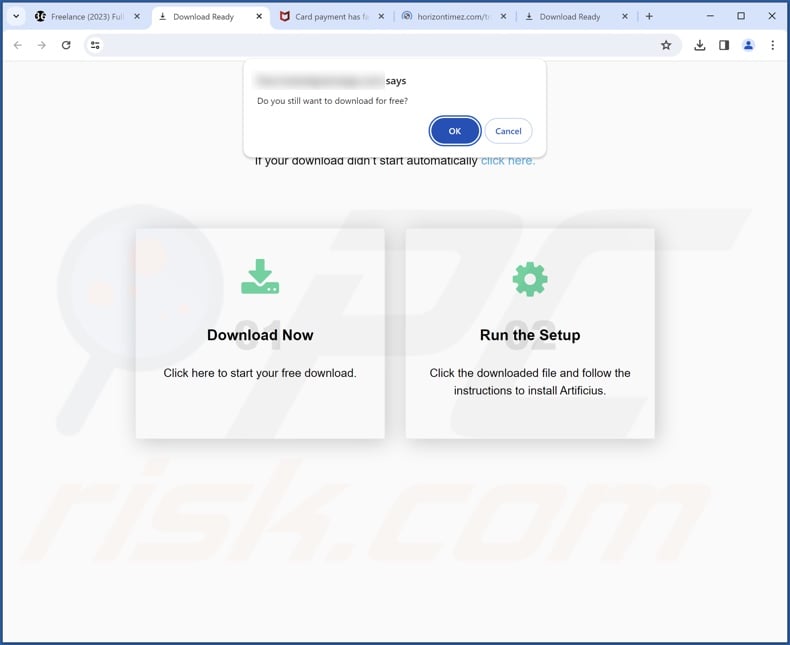
Screenshot of Stratus extension's detailed information:
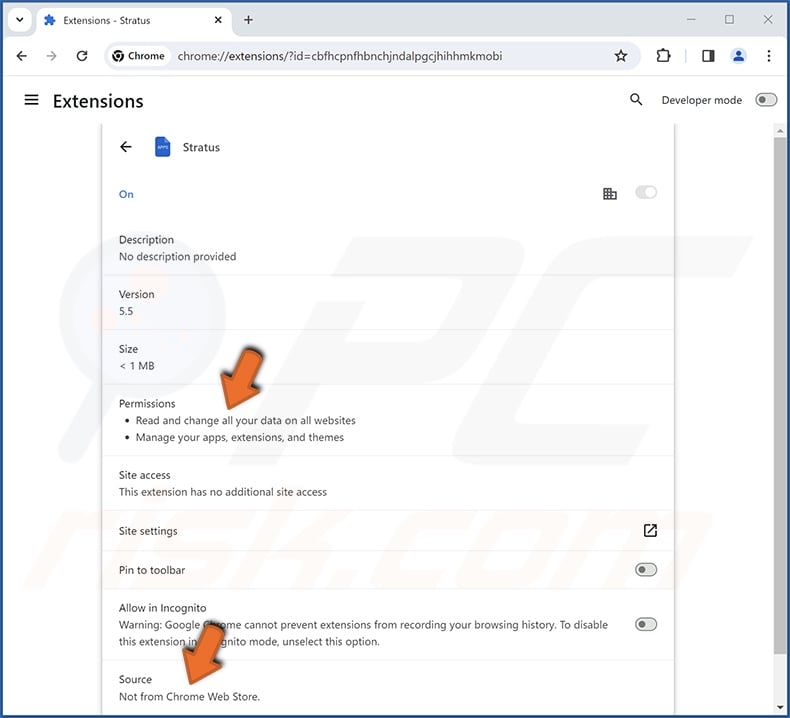
Screenshot of Stratus installed on the Microsoft Edge browser:
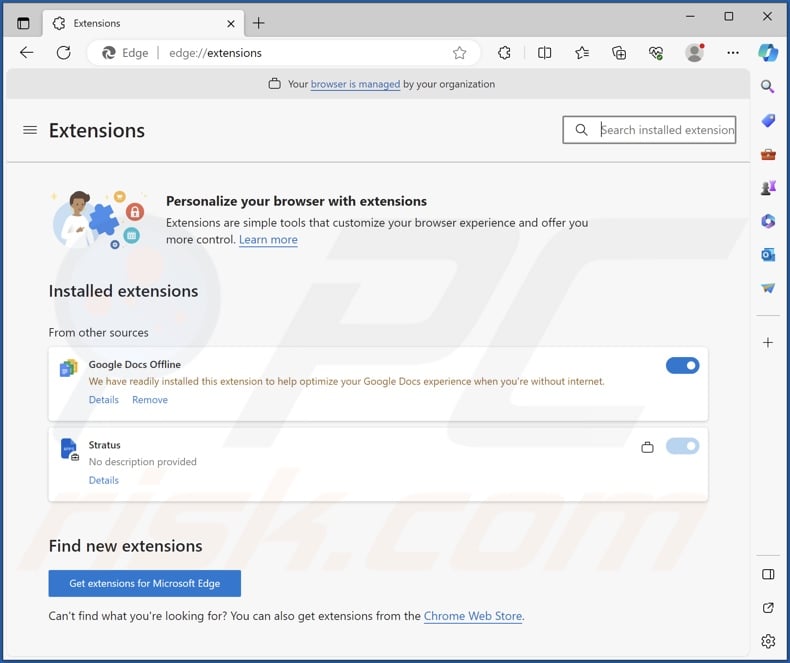
Instant automatic malware removal:
Manual threat removal might be a lengthy and complicated process that requires advanced IT skills. Combo Cleaner is a professional automatic malware removal tool that is recommended to get rid of malware. Download it by clicking the button below:
DOWNLOAD Combo CleanerBy downloading any software listed on this website you agree to our Privacy Policy and Terms of Use. To use full-featured product, you have to purchase a license for Combo Cleaner. 7 days free trial available. Combo Cleaner is owned and operated by RCS LT, the parent company of PCRisk.com.
Quick menu:
- What is Stratus?
- STEP 1. Uninstall unwanted applications using Control Panel.
- STEP 2. Remove rogue extensions from Google Chrome.
- STEP 3. Remove rogue extensions from Mozilla Firefox.
- STEP 4. Remove rogue extensions from Safari.
- STEP 5. Remove rogue plug-ins from Microsoft Edge.
Unwanted software removal:
Windows 11 users:
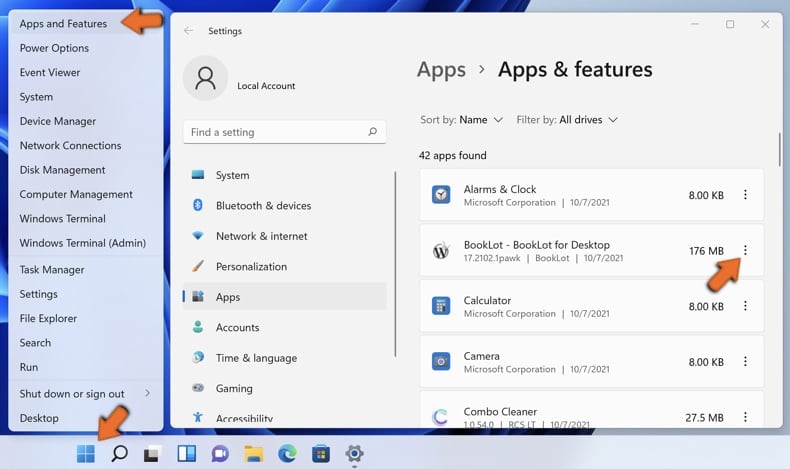
Right-click on the Start icon, select Apps and Features. In the opened window search for the application you want to uninstall, after locating it, click on the three vertical dots and select Uninstall.
Windows 10 users:
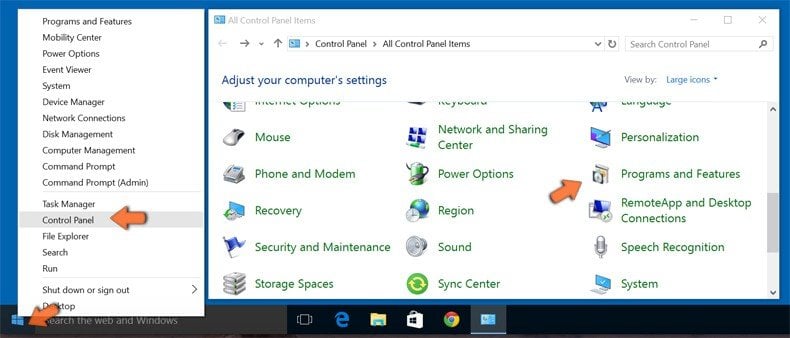
Right-click in the lower left corner of the screen, in the Quick Access Menu select Control Panel. In the opened window choose Programs and Features.
Windows 7 users:
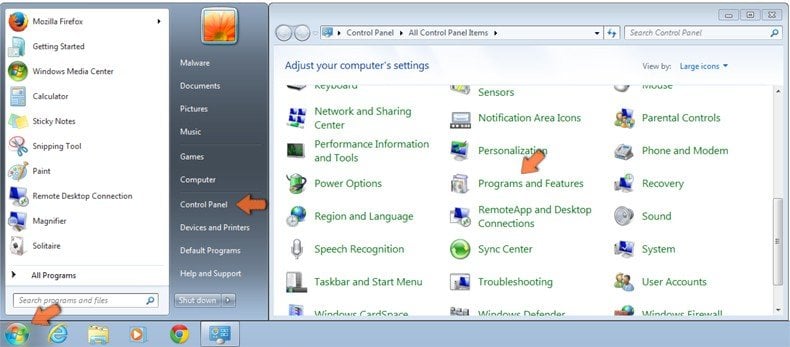
Click Start (Windows Logo at the bottom left corner of your desktop), choose Control Panel. Locate Programs and click Uninstall a program.
macOS (OSX) users:
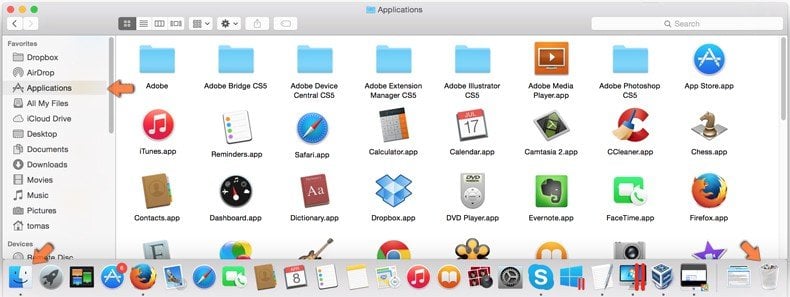
Click Finder, in the opened screen select Applications. Drag the app from the Applications folder to the Trash (located in your Dock), then right click the Trash icon and select Empty Trash.
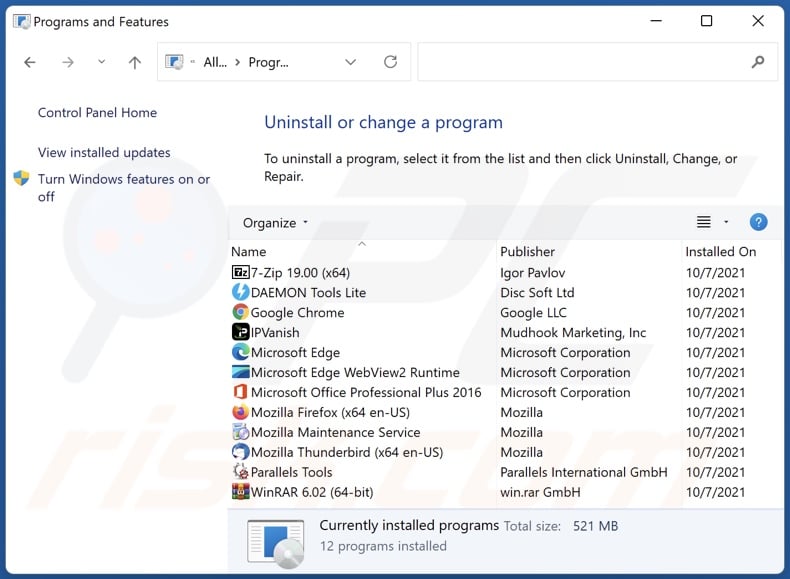
In the uninstall programs window, look for any unwanted applications, select these entries and click "Uninstall" or "Remove".
After uninstalling the unwanted applications, scan your computer for any remaining unwanted components or possible malware infections. To scan your computer, use recommended malware removal software.
DOWNLOAD remover for malware infections
Combo Cleaner checks if your computer is infected with malware. To use full-featured product, you have to purchase a license for Combo Cleaner. 7 days free trial available. Combo Cleaner is owned and operated by RCS LT, the parent company of PCRisk.com.
Remove rogue extensions from Internet browsers:
Video showing how to remove potentially unwanted browser add-ons:
 Remove malicious extensions from Google Chrome:
Remove malicious extensions from Google Chrome:
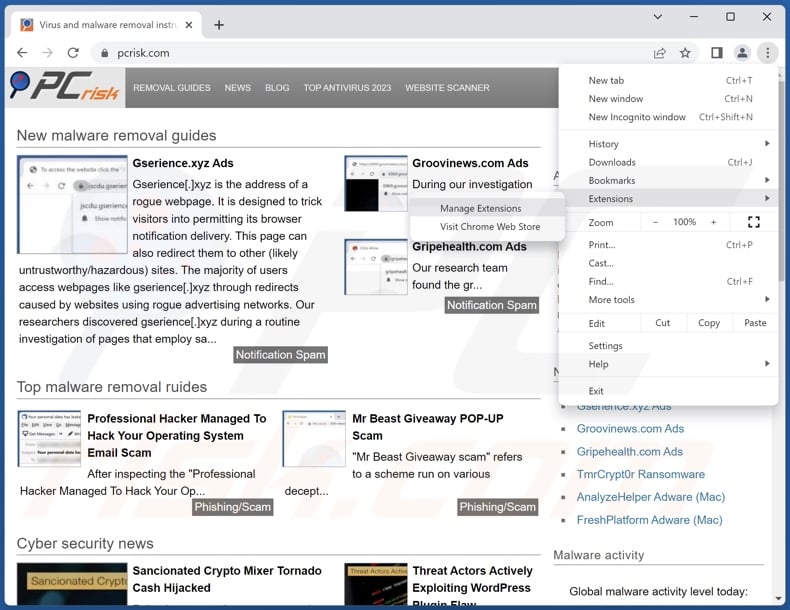
Click the Chrome menu icon ![]() (at the top right corner of Google Chrome), select "Extensions" and click "Manage Extensions". Locate "Stratus" and all other recently-installed suspicious extensions, select these entries and click "Remove".
(at the top right corner of Google Chrome), select "Extensions" and click "Manage Extensions". Locate "Stratus" and all other recently-installed suspicious extensions, select these entries and click "Remove".
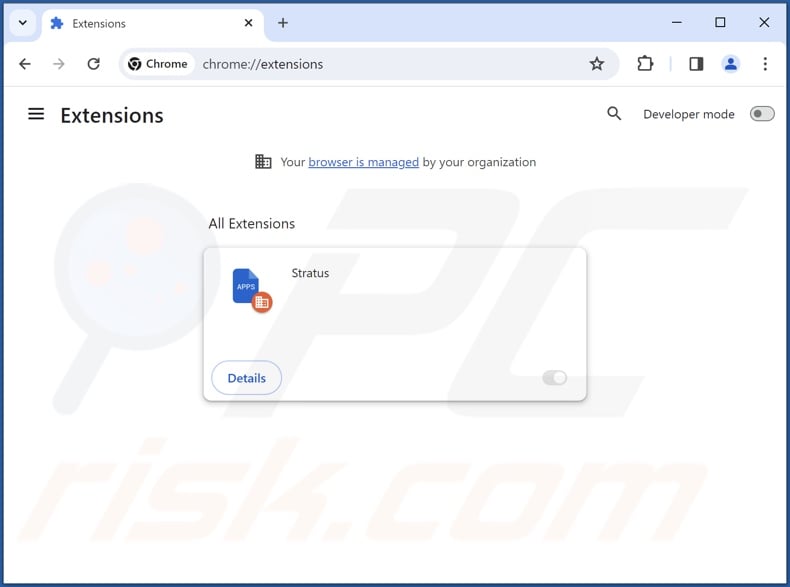
Optional method:
If you continue to have problems with removal of the stratus unwanted browser extension, reset your Google Chrome browser settings. Click the Chrome menu icon ![]() (at the top right corner of Google Chrome) and select Settings. Scroll down to the bottom of the screen. Click the Advanced… link.
(at the top right corner of Google Chrome) and select Settings. Scroll down to the bottom of the screen. Click the Advanced… link.
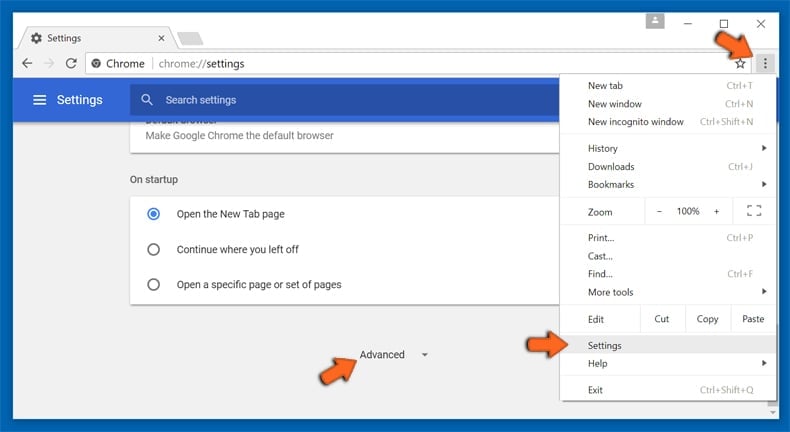
After scrolling to the bottom of the screen, click the Reset (Restore settings to their original defaults) button.
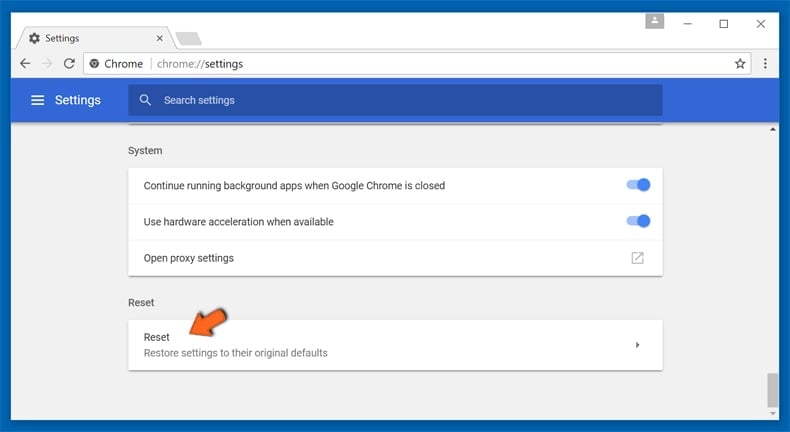
In the opened window, confirm that you wish to reset Google Chrome settings to default by clicking the Reset button.
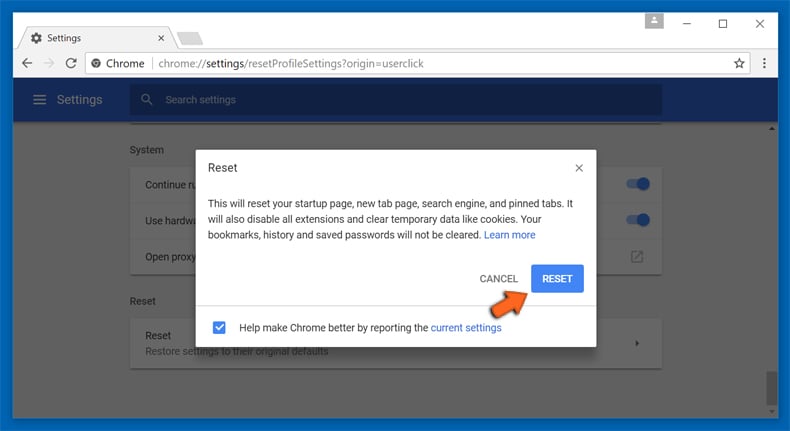
 Remove malicious plugins from Mozilla Firefox:
Remove malicious plugins from Mozilla Firefox:
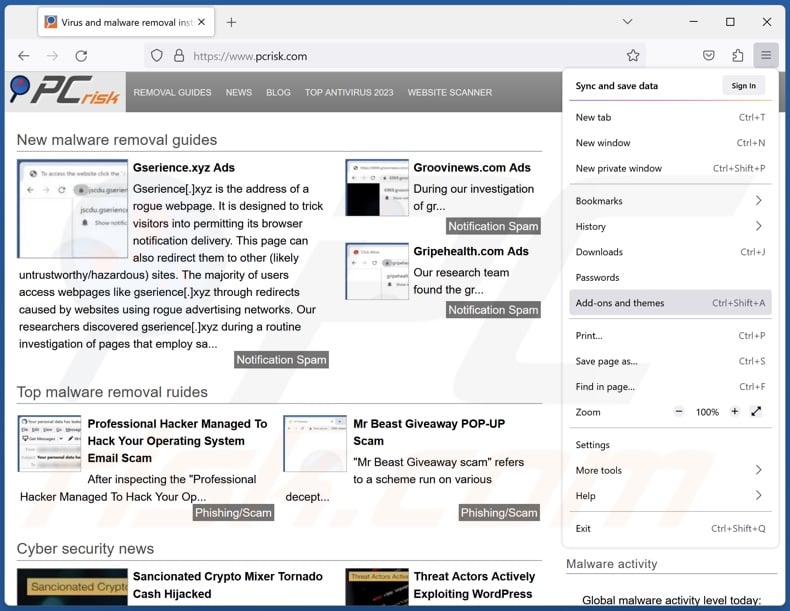
Click the Firefox menu ![]() (at the top right corner of the main window), select "Add-ons and themes". Click "Extensions", in the opened window locate recently-installed suspicious extensions, click on the three dots and then click "Remove".
(at the top right corner of the main window), select "Add-ons and themes". Click "Extensions", in the opened window locate recently-installed suspicious extensions, click on the three dots and then click "Remove".
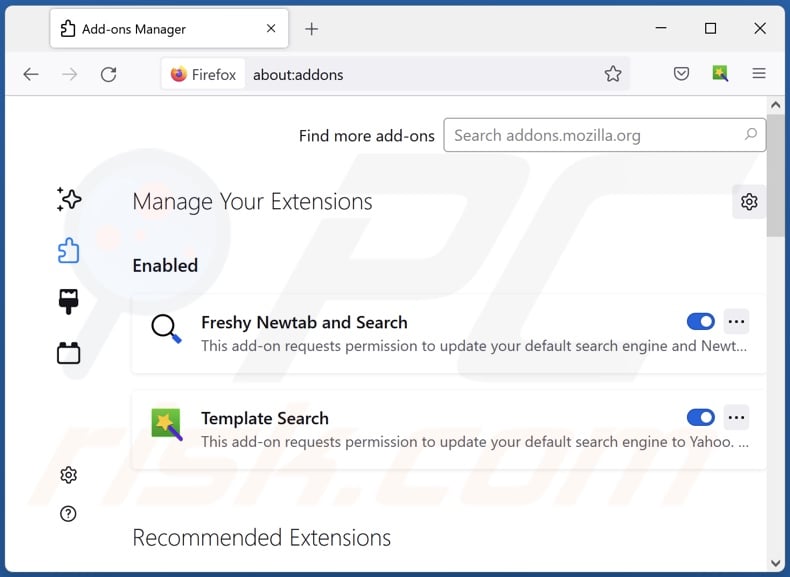
Optional method:
Computer users who have problems with stratus unwanted browser extension removal can reset their Mozilla Firefox settings.
Open Mozilla Firefox, at the top right corner of the main window, click the Firefox menu, ![]() in the opened menu, click Help.
in the opened menu, click Help.
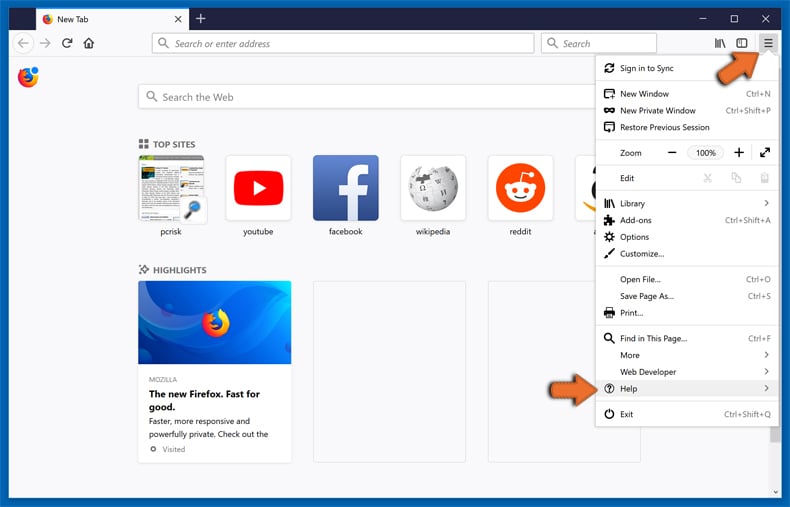
Select Troubleshooting Information.
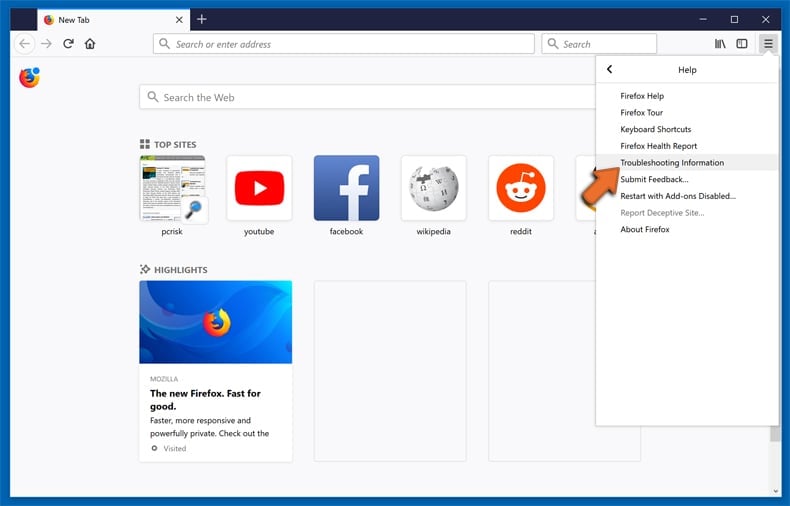
In the opened window, click the Refresh Firefox button.
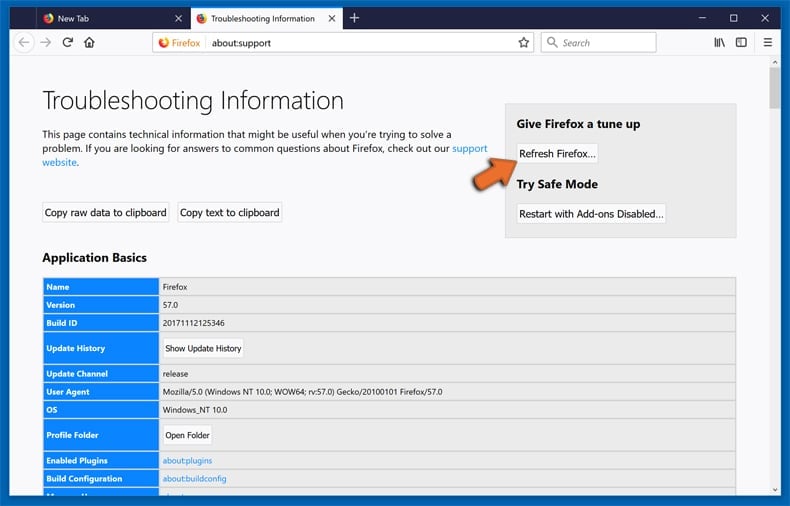
In the opened window, confirm that you wish to reset Mozilla Firefox settings to default by clicking the Refresh Firefox button.
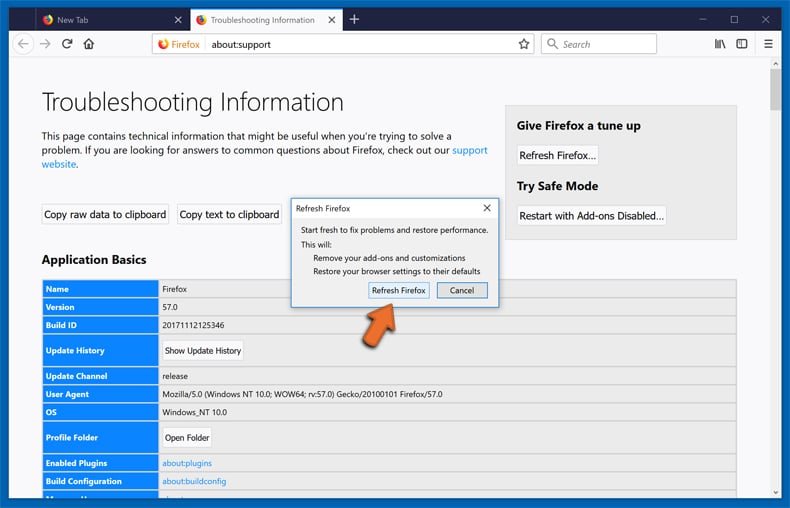
 Remove malicious extensions from Safari:
Remove malicious extensions from Safari:
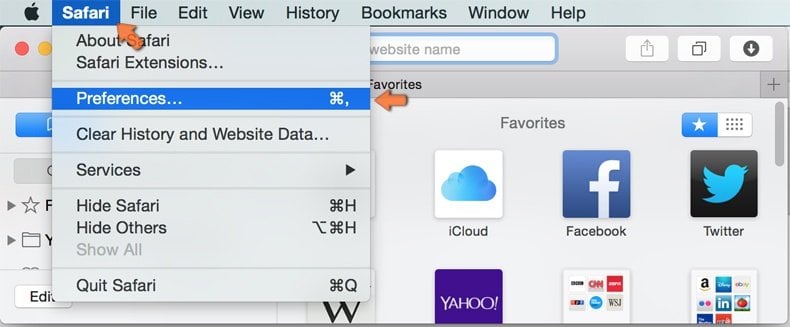
Make sure your Safari browser is active, click Safari menu, and select Preferences....
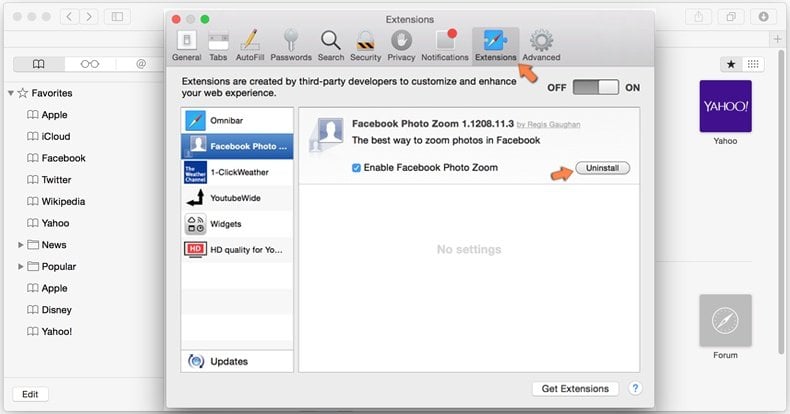
In the opened window click Extensions, locate any recently installed suspicious extension, select it and click Uninstall.
Optional method:
Make sure your Safari browser is active and click on Safari menu. From the drop down menu select Clear History and Website Data...
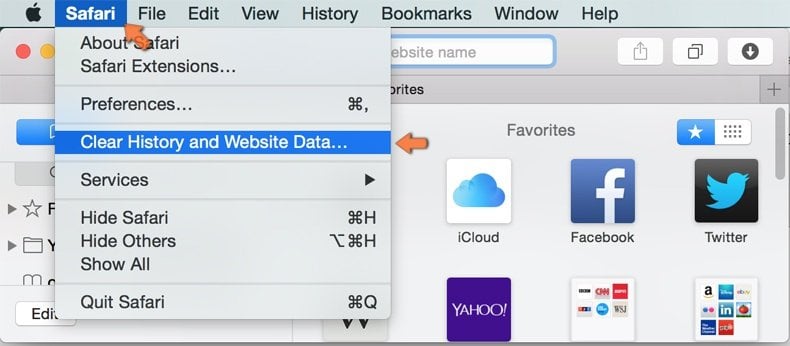
In the opened window select all history and click the Clear History button.
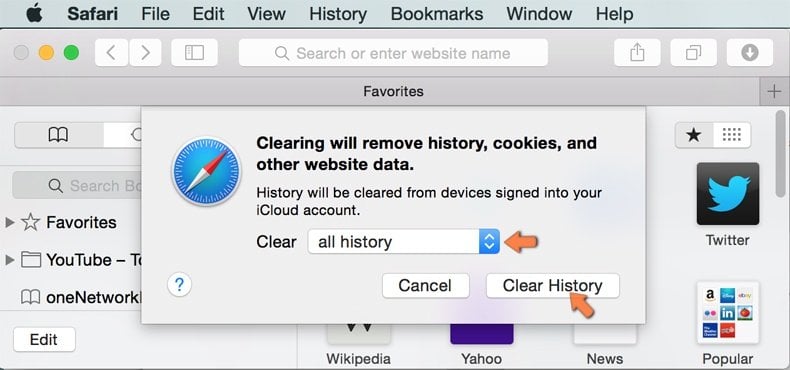
 Remove malicious extensions from Microsoft Edge:
Remove malicious extensions from Microsoft Edge:
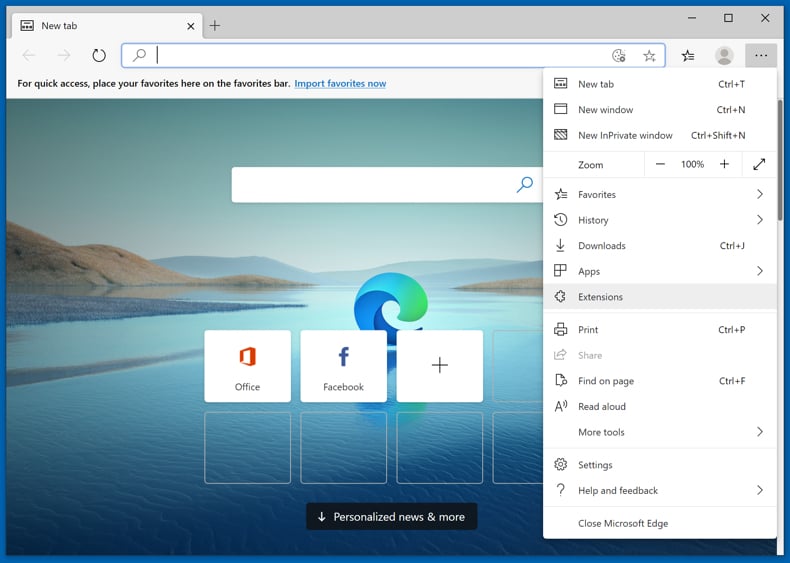
Click the Edge menu icon ![]() (at the upper-right corner of Microsoft Edge), select "Extensions". Locate all recently-installed suspicious browser add-ons and click "Remove" below their names.
(at the upper-right corner of Microsoft Edge), select "Extensions". Locate all recently-installed suspicious browser add-ons and click "Remove" below their names.
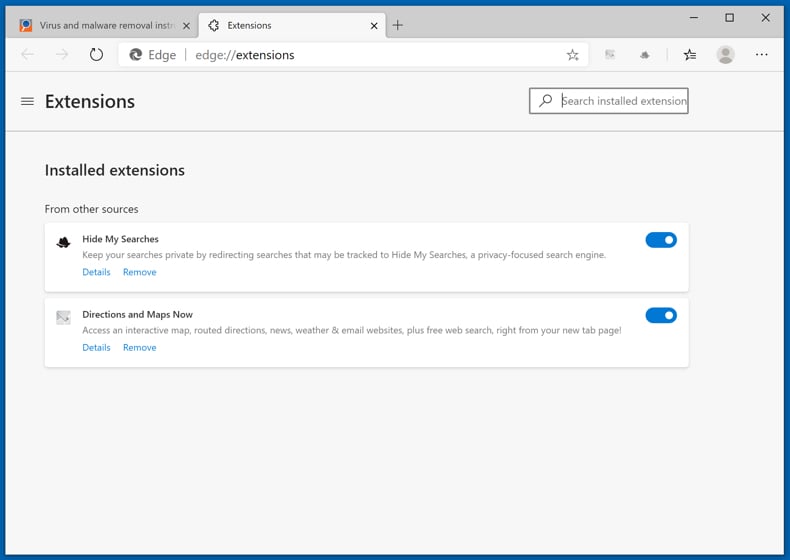
Optional method:
If you continue to have problems with removal of the stratus unwanted browser extension, reset your Microsoft Edge browser settings. Click the Edge menu icon ![]() (at the top right corner of Microsoft Edge) and select Settings.
(at the top right corner of Microsoft Edge) and select Settings.
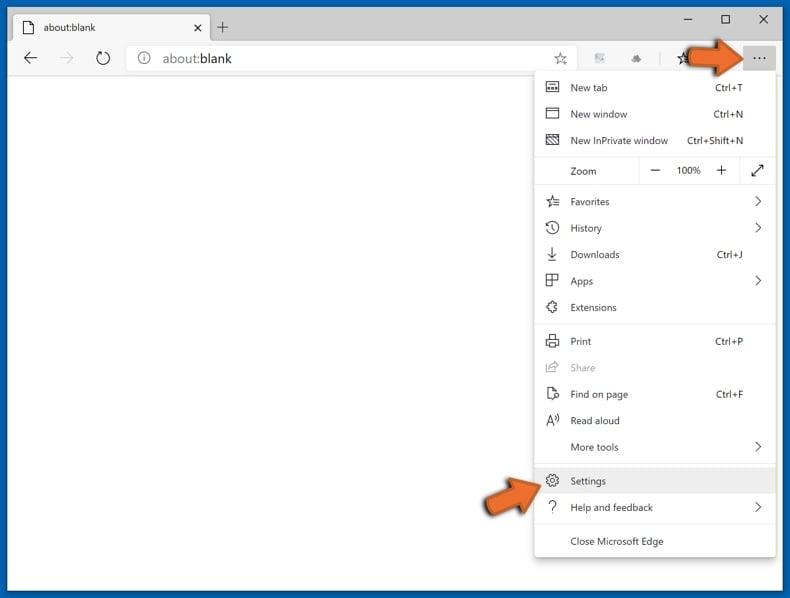
In the opened settings menu select Reset settings.
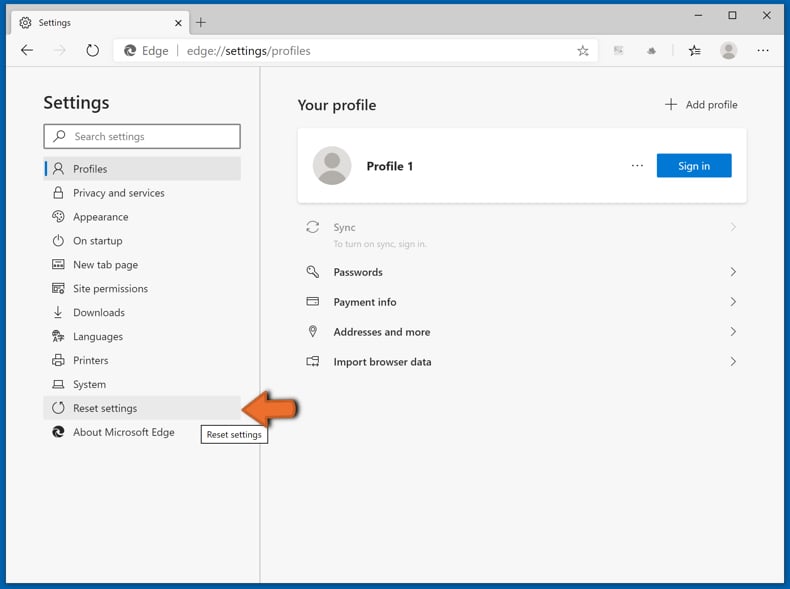
Select Restore settings to their default values. In the opened window, confirm that you wish to reset Microsoft Edge settings to default by clicking the Reset button.
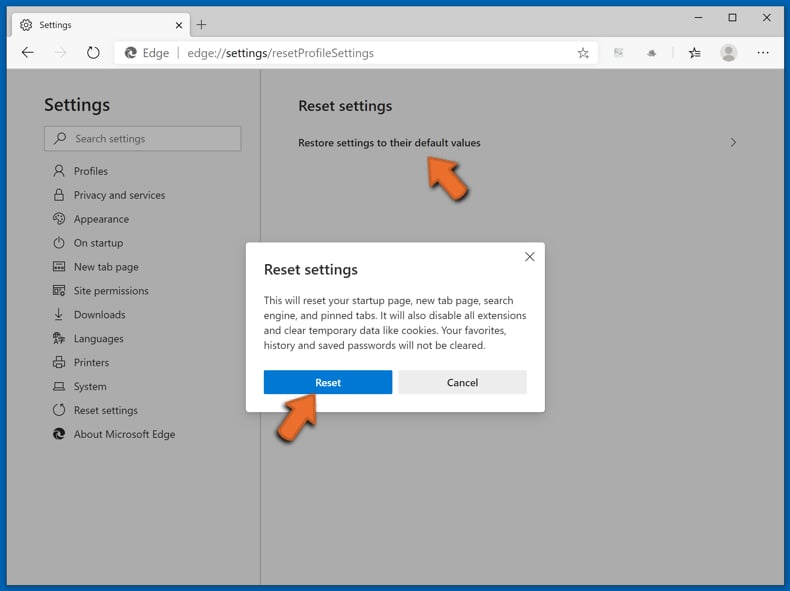
- If this did not help, follow these alternative instructions explaining how to reset the Microsoft Edge browser.
Summary:
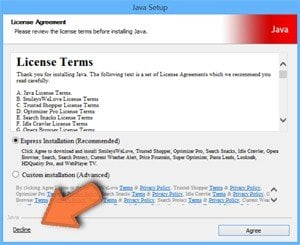 Commonly, adware or potentially unwanted applications infiltrate Internet browsers through free software downloads. Note that the safest source for downloading free software is via developers' websites only. To avoid installation of adware, be very attentive when downloading and installing free software. When installing previously-downloaded free programs, choose the custom or advanced installation options – this step will reveal any potentially unwanted applications listed for installation together with your chosen free program.
Commonly, adware or potentially unwanted applications infiltrate Internet browsers through free software downloads. Note that the safest source for downloading free software is via developers' websites only. To avoid installation of adware, be very attentive when downloading and installing free software. When installing previously-downloaded free programs, choose the custom or advanced installation options – this step will reveal any potentially unwanted applications listed for installation together with your chosen free program.
Post a comment:
If you have additional information on stratus unwanted browser extension or it's removal please share your knowledge in the comments section below.
Frequently Asked Questions (FAQ)
What harm can Stratus cause?
By modifying browsers' appearance and operation, Stratus can cause a variety of severe issues. This extension might be used to detect and exploit browser vulnerabilities – thus furthering the infection. Additionally, Stratus is considered to be a threat to user privacy, as it has data-tracking functionalities.
What does Stratus do?
Stratus can manage browsers' apps, extensions, themes, and other settings. The extension also uses the "Managed by your organization" feature (Chrome, Edge) to gain more control over the browser and to ensure persistence. Stratus is capable of reading browser history and collecting sensitive information as well.
How do Stratus developers generate revenue?
Stratus' developers may sell collected information or otherwise abuse it for profit. Other techniques may be implemented to generate revenue as well. Generally, aside from data sale/abuse, rogue extensions can profit through content promotion (e.g., by displaying ads, causing redirects, etc.).
Will Combo Cleaner remove malicious software?
Yes, Combo Cleaner can detect and remove all manner of threats. It is noteworthy that manual removal (performed without the aid of security tools) might be ineffective. In some instances, after the software has been manually removed – file leftovers stay hidden within the system. These remnants might continue to run and cause problems. Therefore, thorough software removal is paramount.
Share:

Tomas Meskauskas
Expert security researcher, professional malware analyst
I am passionate about computer security and technology. I have an experience of over 10 years working in various companies related to computer technical issue solving and Internet security. I have been working as an author and editor for pcrisk.com since 2010. Follow me on Twitter and LinkedIn to stay informed about the latest online security threats.
PCrisk security portal is brought by a company RCS LT.
Joined forces of security researchers help educate computer users about the latest online security threats. More information about the company RCS LT.
Our malware removal guides are free. However, if you want to support us you can send us a donation.
DonatePCrisk security portal is brought by a company RCS LT.
Joined forces of security researchers help educate computer users about the latest online security threats. More information about the company RCS LT.
Our malware removal guides are free. However, if you want to support us you can send us a donation.
Donate
▼ Show Discussion